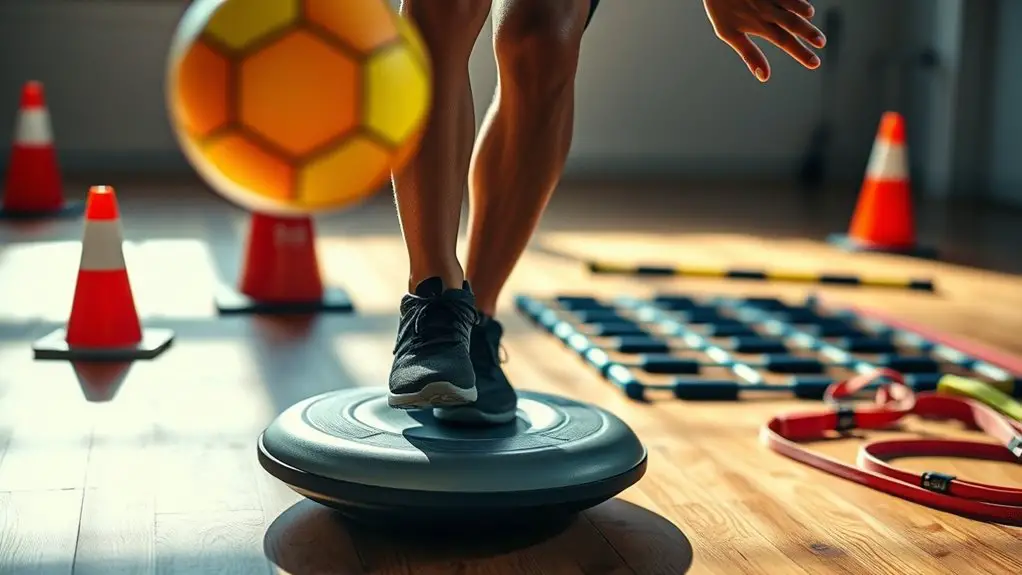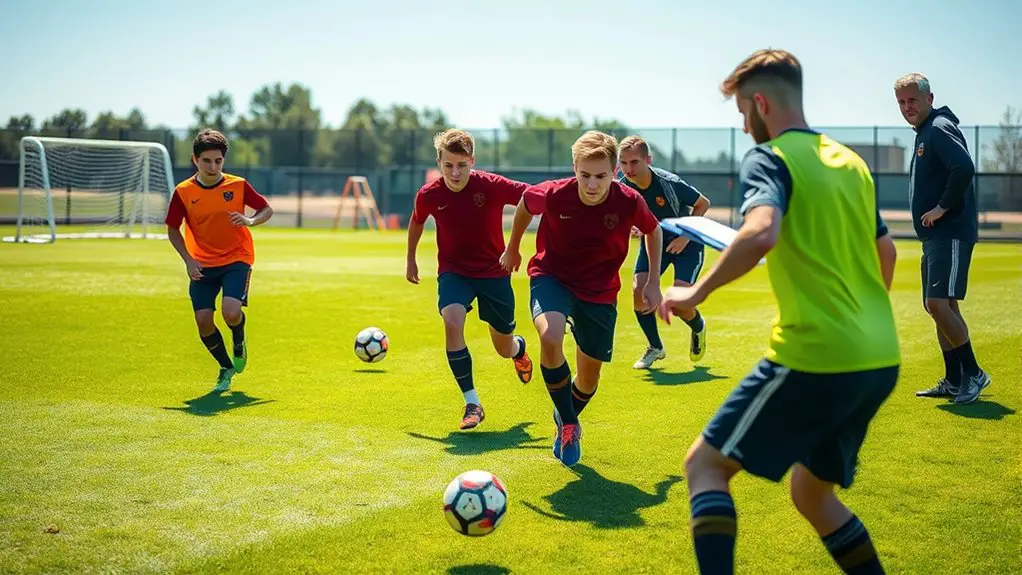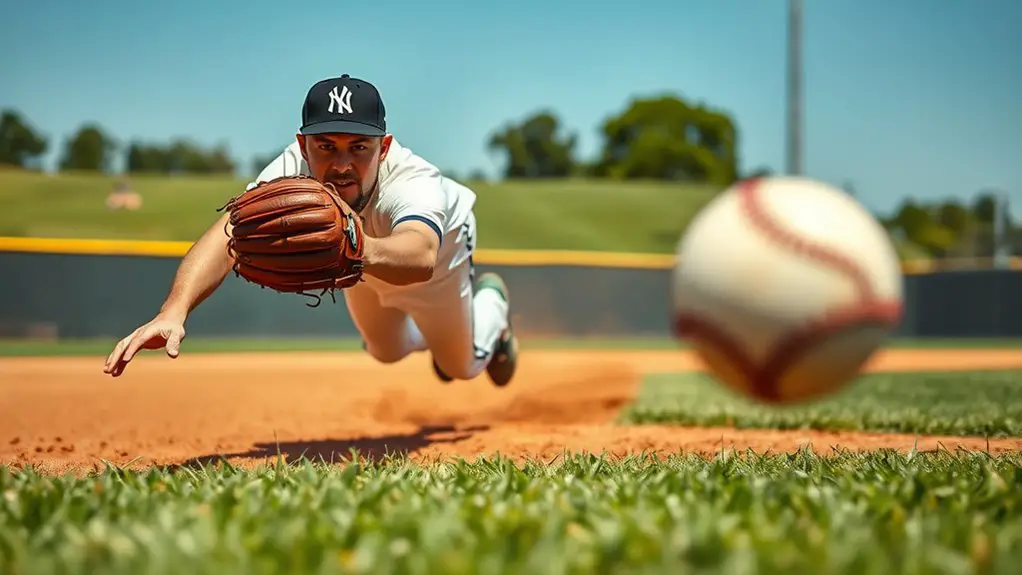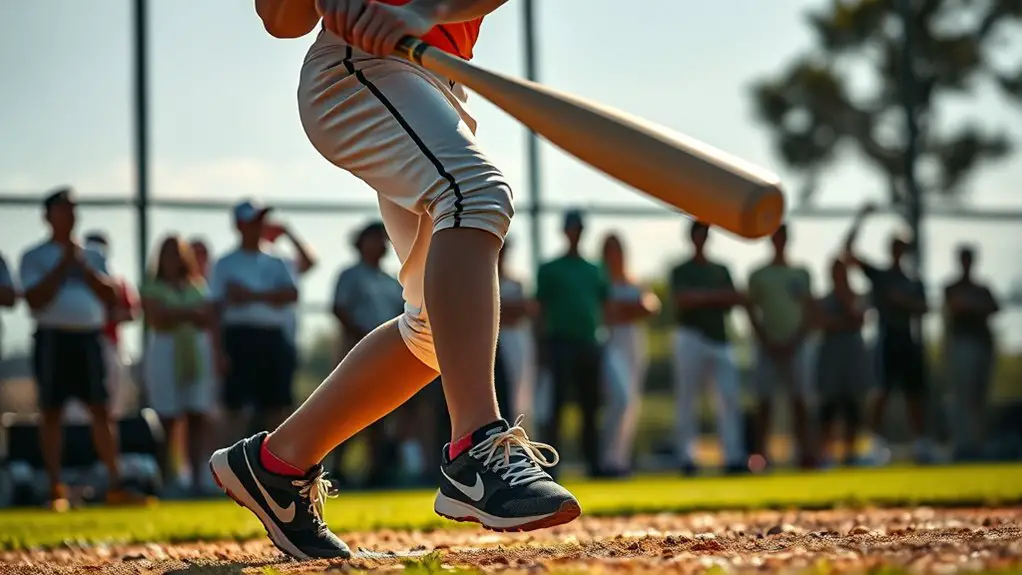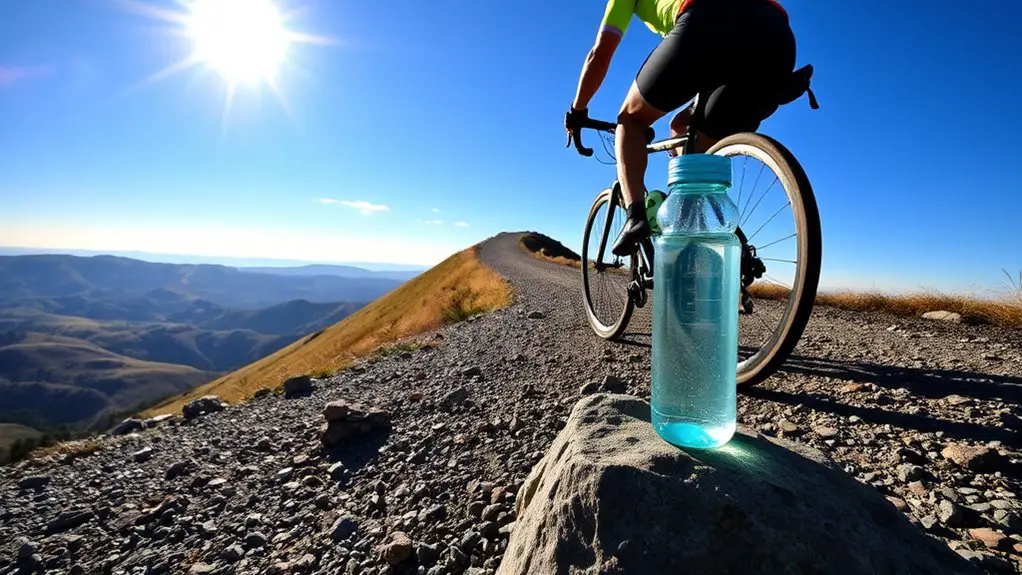To train for better hand-eye coordination, engage in fun activities like juggling, playing catch, or dance routines. Incorporate targeted exercises like reaction time drills and shadow boxing to sharpen your skills. Use technology, such as mobile apps or virtual reality, for immersive training experiences. Consistent practice and monitoring your progress are key. By mixing up your drills and setting achievable goals, you'll see improvements. There's much more to explore on enhancing your skills effectively.
Understanding Hand-Eye Coordination
Hand-eye coordination is essential for many everyday activities, as it involves the brain's ability to process visual information and translate it into precise movements. When you engage in tasks like catching a ball or typing, your brain seamlessly integrates the visual cues you see with your motor skills, enabling you to respond quickly and accurately. This skill is crucial for those who crave freedom in their movements, whether it's dancing, playing sports, or simply traversing through life. Understanding how your brain processes visual input helps you appreciate the intricate connection between sight and action. It's not just about seeing; it's about how you react to what you see. By honing your hand-eye coordination, you can enhance your overall physical capabilities, granting you greater freedom in your daily activities. Embrace the journey of improving this skill, and you'll find yourself moving with increased confidence and agility. Incorporating agility drills into your training can significantly boost your hand-eye coordination and reaction time.
Importance of Hand-Eye Coordination
Hand-eye coordination isn't just for athletes; it plays an essential role in your daily life, from driving to typing. Improving this skill can enhance your performance in sports and even boost your cognitive abilities. Understanding its importance can motivate you to train and refine your coordination for various activities.
Daily Life Applications
Effective hand-eye coordination plays an essential role in our daily lives, impacting activities from driving to playing sports. You rely on it for household tasks, whether you're tidying up with efficient cleaning techniques or managing your pet care with ease. During cooking activities, chopping and measuring require precision, while gardening practices demand the same focus to plant and prune correctly. Your driving skills also hinge on this coordination, allowing you to respond quickly and safely on the road. Even in leisure, playing instruments or diving into crafting projects requires a seamless connection between your hands and eyes. So, enhancing your hand-eye coordination can free you to enjoy daily routines and shopping trips without frustration. Embrace the practice and feel the difference!
Sports Performance Enhancement
While many factors contribute to athletic success, strong hand-eye coordination is essential for peak performance in sports. It's the key to executing your sports strategy effectively, whether you're hitting a baseball, catching a football, or making a quick pass in basketball. By honing this skill, you'll improve your reaction time and accuracy, giving you an edge over your competition.
Incorporating specific training techniques, like practicing with reaction balls or juggling, can greatly enhance your coordination. These activities not only help you develop muscle memory but also allow you to feel more in control of your body during high-pressure situations. Embrace these methods, and you'll notice how your improved hand-eye coordination translates into greater performance and freedom on the field.
Cognitive Development Benefits
As you develop your hand-eye coordination, you'll also be boosting your cognitive skills in ways that can enhance your overall mental performance. This training isn't just about physical prowess; it sharpens your mind too! Here's how improved coordination can lead to greater mental agility:
- Increases focus and concentration
- Enhances problem-solving abilities
- Promotes quicker reaction times
- Boosts memory retention
- Facilitates multi-tasking skills
Fun Activities to Improve Coordination
Whether you're looking to enhance your athletic skills or just want to have some fun, engaging in enjoyable activities can markedly boost your hand-eye coordination. Juggling is a fantastic way to improve your skills while reaping juggling benefits. It requires focus, rhythm, and practice, making it not just a challenge but also a great way to unwind.
Dance routines can also work wonders for your coordination. As you learn the steps and follow the beat, you'll naturally develop better timing and spatial awareness. Plus, it's a fantastic way to express yourself and connect with others.
You might also consider playing catch or joining a sport that emphasizes coordination. These activities aren't just effective; they're enjoyable and liberating. So, immerse yourself in some fun, and watch your hand-eye coordination thrive while you're at it!
Targeted Exercises for Athletes
To boost your hand-eye coordination as an athlete, you'll want to focus on targeted exercises. Incorporating reaction time drills, coordination games, and sport-specific exercises can make a big difference in your performance. Let's explore how these activities can sharpen your skills on the field or court.
Reaction Time Drills
While improving hand-eye coordination, athletes can greatly benefit from incorporating reaction time drills into their training regimen. These drills enhance your quick reflexes and sharpen your focus, allowing you to perform better in your sport. Here are some effective reaction time techniques you can try:
- Ball drop exercise: Have a partner drop a ball from shoulder height, and catch it before it hits the ground.
- Light signal drills: Use a light or app that flashes randomly; react as quickly as possible.
- Reaction ball training: Use a bouncy ball that has an unpredictable bounce to improve your response time.
- Shadow boxing: React to an imagined opponent's movements to enhance your agility.
- Video game reflex training: Play fast-paced games that require quick decision-making.
Incorporate these for better performance!
Coordination Games
Coordination games are an engaging way to enhance your hand-eye coordination and overall athletic performance. These interactive games provide fun coordination challenges that push your limits while keeping you motivated. You can try juggling, where catching and throwing objects improves your timing and focus. Or consider playing catch with a partner using different types of balls to vary the challenge. You could also set up obstacle courses that require quick movements and precise targeting. The beauty of these games is their versatility; you can adapt them based on your skill level or combine them with other drills. By incorporating coordination games into your training, you'll not only develop essential skills but also enjoy the process of becoming a better athlete.
Sport-Specific Exercises
After enjoying coordination games, you might want to take your training a step further with sport-specific exercises. These targeted workouts will sharpen your hand-eye coordination to elevate your performance in your chosen sport. Here are some effective exercises to include:
- Batting drills for improving swing accuracy
- Juggling exercises to enhance focus and dexterity
- Shooting techniques that refine your aim in basketball or soccer
- Passing drills to boost precision in team sports
- Catching practice to improve reliability in racquet sports
Incorporate agility training and ball handling into your routine, and don't forget about target practice. These coordination routines will not only enhance your skills but also give you the freedom to express your athleticism!
Everyday Practices for Better Coordination
Improving your hand-eye coordination doesn't have to be a challenging task; it can easily become part of your daily routine. You can start by using everyday tools around your home. Try juggling small items like socks or oranges to boost your coordination while having fun. This simple practice can make a world of difference.
Mindful practices are also key. Pay attention to your movements during daily activities, like brushing your teeth or cooking. Focus on the connection between your hands and eyes as you perform these tasks.
Incorporate games that require quick reflexes and precision, such as catch or even video games that emphasize hand-eye coordination.
These activities can enhance your coordination naturally, leaving you feeling more in tune with your body. Embrace this freedom to integrate these simple yet effective practices into your life, and you'll reap the benefits without feeling overwhelmed.
Incorporating Technology Into Training
While traditional methods for enhancing hand-eye coordination are effective, incorporating technology can elevate your training experience. By leveraging modern tools, you can boost your skills in engaging and innovative ways. Here are some tech-driven options to evaluate:
- Virtual reality: Immerse yourself in dynamic environments that challenge your coordination.
- Mobile apps: Use handy applications for quick drills and exercises on the go.
- Wearable devices: Track your performance and monitor progress in real-time.
- Interactive software: Engage in exercises that adapt to your skill level, keeping you motivated.
- Gamified training: Turn practice into play with fun challenges that improve your coordination.
Tips for Maintaining Consistency
To build better hand-eye coordination, consistency in your training routine is key. Here are some effective consistency strategies to keep you on track:
| Strategy | Description | Benefits |
|---|---|---|
| Set a Schedule | Dedicate specific times for training | Builds habit and routine |
| Mix It Up | Vary your drills and exercises | Keeps training engaging |
| Track Your Sessions | Log progress and feelings | Identifies what works best |
Incorporating rest days into your routine is essential for maintaining energy and motivation.
Monitoring Progress and Setting Goals
Keeping a consistent training routine is just the starting point; monitoring your progress and setting clear goals will help you take your hand-eye coordination to the next level. By actively engaging in goal setting and progress tracking, you can release your potential and enjoy the freedom of improvement. Here's how to keep yourself on track:
- Set specific, achievable goals for each training session
- Use a journal or app to log your progress
- Regularly reassess your goals based on your improvements
- Celebrate small victories to stay motivated
- Adjust your training methods if you hit a plateau
Additional Resources for Further Learning
What if you could enhance your hand-eye coordination even further with the right resources? You can access your potential by diving into some fantastic books and online courses tailored for skill development. Start with books like "The Talent Code" by Daniel Coyle, which explores how practice shapes performance, or "Peak" by Anders Ericsson, focusing on deliberate practice techniques. Both offer insights that can elevate your training.
For a more interactive approach, check out online courses on platforms like Udemy or Coursera. They often feature specialized programs aimed at improving coordination through various activities, from sports to gaming.
Don't forget to explore YouTube for free tutorials that can guide you through specific drills and exercises. Incorporating reaction time techniques into your training can significantly enhance your hand-eye coordination. With these resources at your fingertips, you can take your hand-eye coordination to new heights, gaining the freedom to excel in whatever pursuits you choose. So, get started and embrace your journey!
Frequently Asked Questions
What Age Is Best to Start Training Hand-Eye Coordination?
Imagine planting a seed in early childhood; the sooner you nurture it, the stronger it grows. Similarly, starting hand-eye coordination training young—around ages 4 to 6—can lay a solid foundation for skill development. Kids' brains are like sponges, soaking up new skills with ease. By introducing engaging activities early on, you're not just teaching them; you're giving them the freedom to explore and master their movements for a lifetime.
Can Hand-Eye Coordination Improve Through Video Games?
Absolutely, video games can have positive effects on your hand-eye coordination. When you immerse yourself in fast-paced games, you're constantly refining your reflexes and skill development. The quick decision-making and precise movements required can sharpen your coordination over time. Plus, the freedom to choose different genres means you can find what resonates with you. So, if you're gaming for fun, you might just be enhancing your coordination without even realizing it!
How Long Should Training Sessions Be for Optimal Results?
When you're starting your journey to enhance your skills, think of it as a delightful adventure rather than a chore. For best results, keep your training sessions between 20 to 30 minutes, allowing your mind and body to flourish without feeling overwhelmed. Aim for a frequency of three to five times a week. This balanced approach helps maintain enthusiasm and guarantees your progress remains steady, giving you the freedom to enjoy the process.
Are There Specific Diets That Support Better Coordination?
Absolutely, specific diets can enhance your coordination. Focusing on food choices rich in omega-3 fatty acids, like salmon and walnuts, can boost brain function. Antioxidant-rich fruits and vegetables, like berries and spinach, offer nutrient benefits that improve overall cognitive performance. Don't forget whole grains for sustained energy. By fueling your body with the right nutrients, you'll feel more agile and responsive, giving you the freedom to perform at your best.
Can Hand-Eye Coordination Decline With Age?
They say, "You can't teach an old dog new tricks," but that's not entirely true! As you age, you might notice some decline in coordination, but it doesn't have to be a permanent change. Engaging in coordination exercises can help maintain and even improve your skills. Embrace the freedom to challenge yourself, and you'll find that with dedication and practice, aging effects on coordination can be managed effectively. Don't let age define you!
